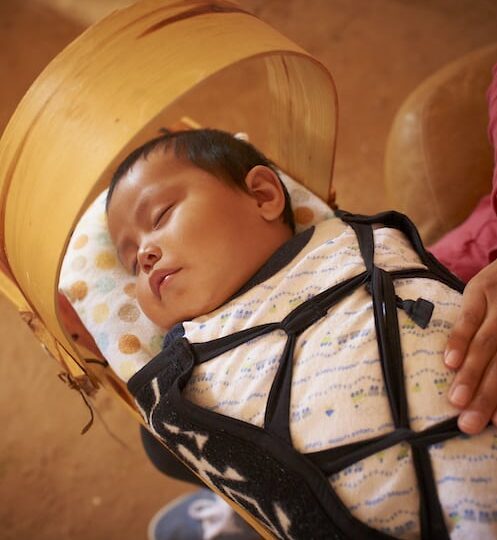
A generation in the making, a powerful new preventive medicine expected to be approved by US agencies will avert illness from the common and sometimes life-threatening respiratory syncytial virus that affects Indigenous children more severely and at higher rates
Nearly all children will be infected with respiratory syncytial virus (RSV) by age 2. While RSV causes cold-like symptoms in older children and adults, this illness in infants can be very serious, leading to hospitalizations for bronchiolitis or viral pneumonia. Indigenous children have historically had among the highest rates of RSV in the world, with hospital wards filling up with RSV-sickened infants during the winter season.
Until this year, the only available protection against RSV was given to infants at highest risk —those born more than two months prematurely or those with congenital lung or heart disease. This medicine required a series of five monthly injections.
Infants, parents, and elders will breathe easier during RSV season with the expected introduction of several new preventive medicines.
The Food and Drug Administration’s drug advisory committee unanimously endorsed Beyfortus™ (nirsevimab, made by AstraZeneca), a long-acting monoclonal antibody, for the prevention of RSV in infants entering their first RSV season. To make its decision, the FDA committee reviewed data from studies including MELODY, a trial our Center partnered with Navajo Nation communities of Fort Defiance, Gallup, and Shiprock as part of a global study with 21 countries. Beyfortus is expected to be approved by the FDA and recommended by the Center for Disease Control and Prevention for all infants by the 2023-24 RSV season.
A journey to protect against RSV
In partnership with the Navajo Nation, the Center began enrolling participants in the MELODY trial in 2019, paused for a year because of the pandemic, and then resumed enrollment in challenging conditions in the fall of 2021, when community members, including Center staff, were still grappling with loss and illness from COVID.
Because of the monumental efforts of many, around 5% of MELODY trial participants were American Indian/Alaska Native (AI/AN), and the study—results published in the New England Journal of Medicine—was able to show that nirsevimab was highly effective in preventing RSV lower respiratory tract illness (75% overall and 90% in the subgroup of AI/AN infants).
Historically, RSV-associated hospitalization rates among American Indian and Alaska Native (AI/AN) children have been among the highest in the world. Consequently, Beyfortus™, along with forthcoming expected vaccines against RSV, has the potential to make a major impact on the health of Indigenous and other children and families.
Historic milestone for Indigenous health partnerships
Since RSV was discovered in 1956, the world has searched for a successful protective vaccine or treatment. The availability of preventive RSV products marks another milestone for partnerships between Indigenous nations and the Center for Indigenous Health. The Center has a four-decade history of working in partnership with Native communities to find better solutions to protect against infectious disease inequities. Three vaccines given to U.S. infants in the first year of life—Hib, pneumococcal, and rotavirus vaccines—were first proven effective by the Center with Native communities in the Southwest, where infants were disproportionately affected by these diseases and communities sought solutions. Further, the Center’s work informs national policy to support the use of proven interventions, like Beyfortus™, that prevent infectious diseases in Native communities.
The high rates of RSV in Indigenous populations are driven by socioeconomic barriers to health related to poverty, household crowding, a lack of indoor plumbing, indoor air pollution, and limited access to care.
Two RSV vaccines (ABRYSVO™, by Pfizer, and Arexvy™, by GSK) are now available for adults 60 and older. The CDC’s Advisory Committee on Immunization Practices (ACIP) voted that people over 60 years may receive an RSV vaccine after consultation with their provider. In August, the FDA will decide whether to license ABRYSVO™ for use in pregnant women, to be administered late in the 2nd or early 3rd term. This use of ABRYSVO™, referred to as maternal administration, would protect infants from RSV for several months after birth.
Update 08/04/23 – The CDC Advisory Committee on Immunization Practices (ACIP) voted to recommend a shot of nirsevimab to prevent RSV for all infants. In addition, the ACIP recommended that American Indian and Alaska Native (AI/AN) children aged 8-19 months receive a second dose to protect them during their second RSV season. This decision was informed by the Center for Indigenous Health’s respiratory surveillance study, which found that rates of RSV hospitalization in the second year of life were 4-10 x higher in AI/AN children compared to national data. This is a prime example of how community priorities guide research activities, which can shape policy for American Indian and Alaska Native children.
The Center looks ahead to educational and training efforts to ensure Indigenous communities are aware of the options for protecting infants and elders against RSV in forthcoming seasons.